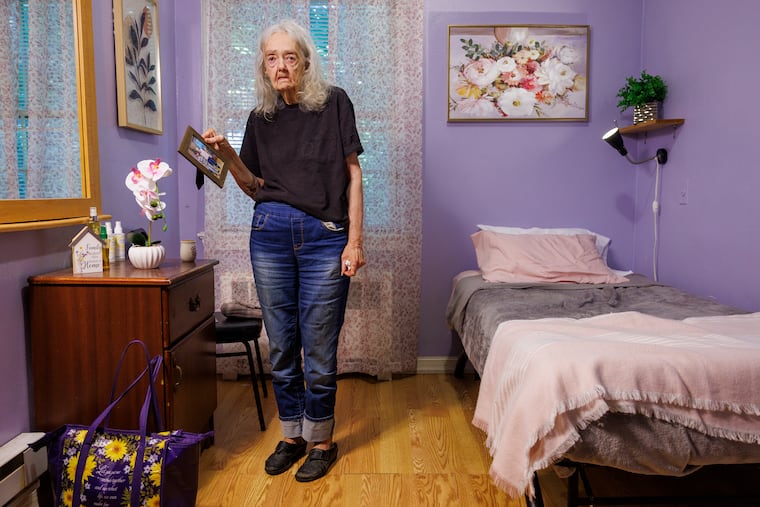These seniors’ personal care facility suddenly closed. Then, some of their belongings went missing.
This type of rapid, emergency shutdown is uncommon among facilities, according to DHS.

Mildred Krzystan, who is 77 years old and has given her final wishes some thought, knew she wanted her jewelry, family heirlooms, and priceless family photographs to go to her relatives after her death. Then, her treasured possessions went missing when Bethesda Court, the personal care home in East Germantown where she’s spent the last two years, closed with a week’s notice.
In the chaos of moving from one facility to another, Krzystan said some of her most valuable possessions, along with clothes that still had the tags on, disappeared.
“I was very, very hurt about my belongings, my personal property,” she said. “Everything was wiped out.”
Months later, Krzystan and at least three other former Bethesda Court residents are seeking answers about what exactly prompted the facility’s March closure, lamenting their lost valuables, and upset no one has been held accountable.
Bethesda Court operated as a personal care home for almost two decades. Compared with nursing homes and assisted living residences, these homes are for people who need a place to live and assistance with personal care tasks but don’t require clinical staff on site. Older residents can live at a personal care home, as can people with physical, behavioral health, or cognitive disabilities.
The state Department of Human Services, which licenses these facilities, said 75 residents were living in Bethesda Court when it closed. The majority of residents were over 60 and had been diagnosed with some form of mental illness, according to the most recent licensing inspection summary.
Residents said the facility had a history of bed bugs and couldn’t always handle petty disputes between roommates. Some residents recalled a fight last fall between two residents that resulted in one stabbing the other with a knife. According to a DHS description, no staff member was in the facility to aid the injured resident. Another resident dialed emergency services.
DHS informed Bethesda Court that it would not renew its license in March, citing the facility’s “failure to comply with the department’s regulations, gross incompetence, negligence and misconduct in operating the facility(s) and failure to submit an acceptable plan to correct noncompliance items.”
At the time of the March 18 notice, the facility needed to address issues in its management system for residents’ finances.
When a facility is found to be violating state requirements, DHS works with the operator to craft a “plan of correction” and an agreed-upon deadline. Bethesda failed to meet its deadlines to address some of the issues highlighted in DHS inspections.
A denied license renewal isn’t an automatic death knell for an operator, which can appeal the decision within 10 days.
Bethesda Court did not appeal, and instead informed DHS on March 21 that it would have to close by the end of the month. Under Pennsylvania Code, these homes generally must give a 30-day notice to residents or their caretakers if a discharge or transfer is to take place.
According to DHS, Bethesda Court cited financial hardship and the inability to safely operate beyond 10 days in its request asking the state to help relocate residents, which the agency did by March 28.
Krzystan’s 81-year-old cousin — who said she didn’t want to be identified because she’s “too old” to be in the news — tried to get in touch with Bethesda Court, which proved difficult with no point of contact after closure. Those connected to 6200 Ardleigh LLC, which is listed as the owner of the facility, did not respond to messages from The Inquirer.
This type of rapid, emergency shutdown is uncommon, according to DHS.
Learning of the circumstances of his former home’s closure is little solace for Paul Karetny, 62. He remembers seeing a notice posted in the common area informing him of Bethesda Court’s imminent closure, but no timeline that he can recall. His DVD player, brand-new radio, treasured CDs, high school yearbook, and other priceless photographs went missing in the move.
“It wasn’t enough to go on,” he said of the information he had at the time. “I could have gotten my stuff out or put it in a suitable place.”
DHS said it had no role in removing people’s personal belongings, adding that some of the receiving facilities did not accept certain items because of a previously reported bedbug problem at Bethesda Court. It was unclear who was involved in removing the items.
DHS said residents living in long-term care facilities with complaints can reach out to the state’s Long-Term Care Ombudsman Program or DHS’ Office of Long-Term Living with questions.
Though Karetny and Krzystan see their new home placements as improvements and are now resigned to the idea that they won’t get their valuables back, they lament what they see as a lack of accountability in the hasty closure. They hope their experience can at least serve as a warning to others.
“It’s not fair,” said Krzystan. “They shouldn’t get away with this.”
Staff writer Ryan Briggs contributed to this article.